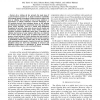Free Online Productivity Tools
i2Speak
i2Symbol
i2OCR
iTex2Img
iWeb2Print
iWeb2Shot
i2Type
iPdf2Split
iPdf2Merge
i2Bopomofo
i2Arabic
i2Style
i2Image
i2PDF
iLatex2Rtf
Sci2ools
ICC
2009
IEEE
2009
IEEE
Load Aware Broadcast in Mobile Ad Hoc Networks
In a wireless ad hoc network, the main issue of a good broadcast protocol is to attain maximum reachability with minimal packet forwarding. Existing protocols address this issue by utilizing the knowledge of up to 2-hop neighbors to approximate an MCDS (minimum connected dominating set) via heuristics derived from techniques known as Self pruning and Dominant pruning. Our experiments show that, using these greedy choice heuristics result in a biased load distribution throughout the network. Some nodes become heavily loaded and consequently packets through those nodes, whether unicast or broadcast, experience significantly larger delay. Contention and collision also increase at some regions, while they are relatively low at other regions. In this paper we address these issues, and propose various methods to evenly distribute the load caused by broadcast packets. Our algorithms take various reactive measures to dynamically include less loaded nodes in the forward list, while maintaining ...
Communications | ICC 2009 | Minimal Packet Forwarding | Packet Forwarding | Wireless Ad Hoc Network |
| Added | 18 Feb 2011 |
| Updated | 18 Feb 2011 |
| Type | Journal |
| Year | 2009 |
| Where | ICC |
| Authors | Md. Tanvir Al Amin, Sukarna Barua, Sudip Vhaduri, Ashikur Rahman |
Comments (0)

